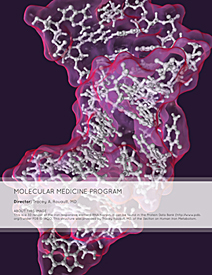You are here: Home > Molecular Medicine Program
Molecular Medicine Program
Director: Tracey A. Rouault, MD
Researchers in the Program in Molecular Medicine seek to understand mechanisms of disease through analysis of mouse models and studies of human patients. Abnormalities of metal homeostasis are under investigation, including the role of iron misregulation in the pathogenesis of neurodegeneration and refractory anemias and the role of copper transport abnormalities in Menkes disease and related conditions.
Stephen Kaler's Unit on Human Copper Metabolism investigates the copper transport disorder Menkes disease and its allelic variant, occipital horn syndrome—in particular the effects of early diagnosis and treatment. In an ongoing clinical trial, the Unit evaluates patient materials with cellular and molecular bench methods. Recently, the Unit published a study demonstrating that initiation of copper replacement therapy in neonatal Menkes disease patients shortly after birth greatly improves neurological outcomes. The Unit also demonstrated that gene therapy in conjunction with copper injection can substantially extend life in a murine Menkes model. Moreover, in recent work, several mutations in the Menkes disease gene were shown to cause a distal motor neuropathy.
Using mouse models and tissue culture, Tracey Rouault's Section on Human Iron Metabolism studies mammalian iron metabolism. Rouault previously identified and characterized two major cytosolic iron-regulatory proteins (IRP). Targeted deletion of each IRP in mice revealed that misregulation of iron metabolism due to loss of IRP2 causes functional iron deficiency, erythropoietic protoporphyria, anemia, and neurodegeneration. The Section also focuses on mammalian iron sulfur cluster assembly because of its relevance to IRP1 regulation. Researchers in the Section characterized numerous mammalian genes involved in iron-sulfur cluster synthesis and developed in vitro and in vivo methods to assess iron sulfur cluster biogenesis. The Section's discoveries may promote understanding and treatment of neurodegenerative diseases, especially Parkinson's disease and Friedreich ataxia and hematologic disorders such as refractory anemias and erythropoietic protoporphyria. The Section recently discovered that use of Tempol, a stable nitroxide, prevents neurodegeneration in a mouse deficient in IRP2. The Section is pursuing studies to elucidate the pathophysiology in three diseases caused by defects in iron sulfur cluster biogenesis, including Friedreich ataxia, ISCU myopathy, and GLRX5 sideroblastic anemia.



